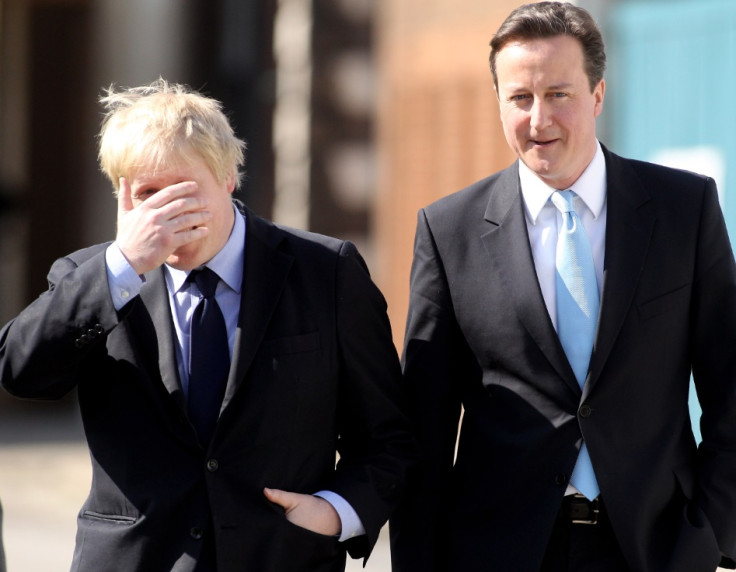EU referendum: Boris Johnson warns of EU colonisation and insists the UK is better off out

The Mayor of London, Boris Johnson, has warned Britons of the slow and invisible process of the EU's legal colonisation of the UK as it "infiltrates" every area of the British public policy. Pressing his argument to leave the bloc, he said the only way they can get the changes they need is to vote to leave the European Union. "All EU history shows that they only really listen to a population when it says No," said Johnson.
Writing in the Telegraph, Johnson listed his arguments as to why the UK will be better off outside the EU. "The fundamental problem remains: that they have an ideal that we do not share. They want to create a truly federal union, e pluribus unum, when most British people do not."
"It is time to seek a new relationship, in which we manage to extricate ourselves from most of the supranational elements," Johnson said. He also warned: "We will hear a lot in the coming weeks about the risks of this option, the risk to the economy, the risk to the City of London, and so on; and though those risks cannot be entirely dismissed, I think they are likely to be exaggerated." He referred to when London chose to opt out of the euro despite fears of doing so.
He also accepted that the UK leaving the bloc will cause fresh problems with Scotland which has vowed to demand independence if the Leave vote won. "On the other hand, most of the evidence I have seen suggests that the Scots will vote on roughly the same lines as the English," Johnson said.
On claims that the UK would be better off remaining within the bloc because of the "influence" it will have, he said that this was becoming less and less persuasive to him. "Only 4% of people running the Commission are UK nationals when Britain contains 12% of the EU population," he said.
Further, he added: "It is not clear why the Commission should be best placed to know the needs of UK business and industry, rather than the myriad officials at UK Trade & Investment or the Department for Business, Innovation and Skills." While he acknowledged that there would be a need to negotiate a large number of trade deals very fast, that should not be impossible.
Nanny state?
"We have become so used to Nanny in Brussels that we have become infantilised, incapable of imagining an independent future. We used to run the biggest empire the world has ever seen, and with a much smaller domestic population and a relatively tiny Civil Service. Are we really unable to do trade deals?"
He said the UK has at least two years in which the existing treaties will be in force. Johnson warned that a vote to Remain in the EU will be taken by Brussels as "a green light for more federalism and for the erosion of democracy."
He highlighted how the British public can see "all too plainly the impotency of their own elected politicians - as with immigration. That enrages them, not so much the numbers as the lack of control. That is what we mean by loss of sovereignty - the inability of people to kick out, at elections, the men and women who control their lives. We are seeing an alienation of the people from the power they should hold, and I am sure this is contributing to the sense of disengagement, the apathy, the view that politicians are 'all the same' and can change nothing, and the rise of extremist parties."
He warned that there is a document called "The Five Presidents Report" which is "floating around Brussels" in which the leaders of the various EU institutions map out ways to save the euro. This involves more integration, a social, politicial and budgetary union.
EU legislation
Boris also noted how anything between 15% and 50% of UK legislation now comes from the EU. "It is unstoppable and it is reversible - since it can only be repealed by the EU itself. We are seeing a slow and invisible process of legal colonisation, as the EU infiltrates just about every area of public policy."
He said initially the European Court of Justice first contented itself with the single market in ensuring free and fair trade across the EU. "We are now way beyond that stage." He said that under the Lisbon Treaty, the court now has the ability to "vindicate people's rights under the 55-clause Charter of Fundamental Human Rights," which includes such entitlements as the right to found a school, or the right to pursue a freely chosen occupation anywhere in the EU or the right to start a business.
He also noted how some of the EU rules "sound simply ludicrous, like the rule that you can't recycle a teabag, or that children under eight cannot blow up balloons, or the limits on the power." He said that the UK could not do anything to bring in better-designed cab windows for trucks to stop cyclists from being crushed. "It had to be done at a European level and the French were opposed."
© Copyright IBTimes 2025. All rights reserved.






















